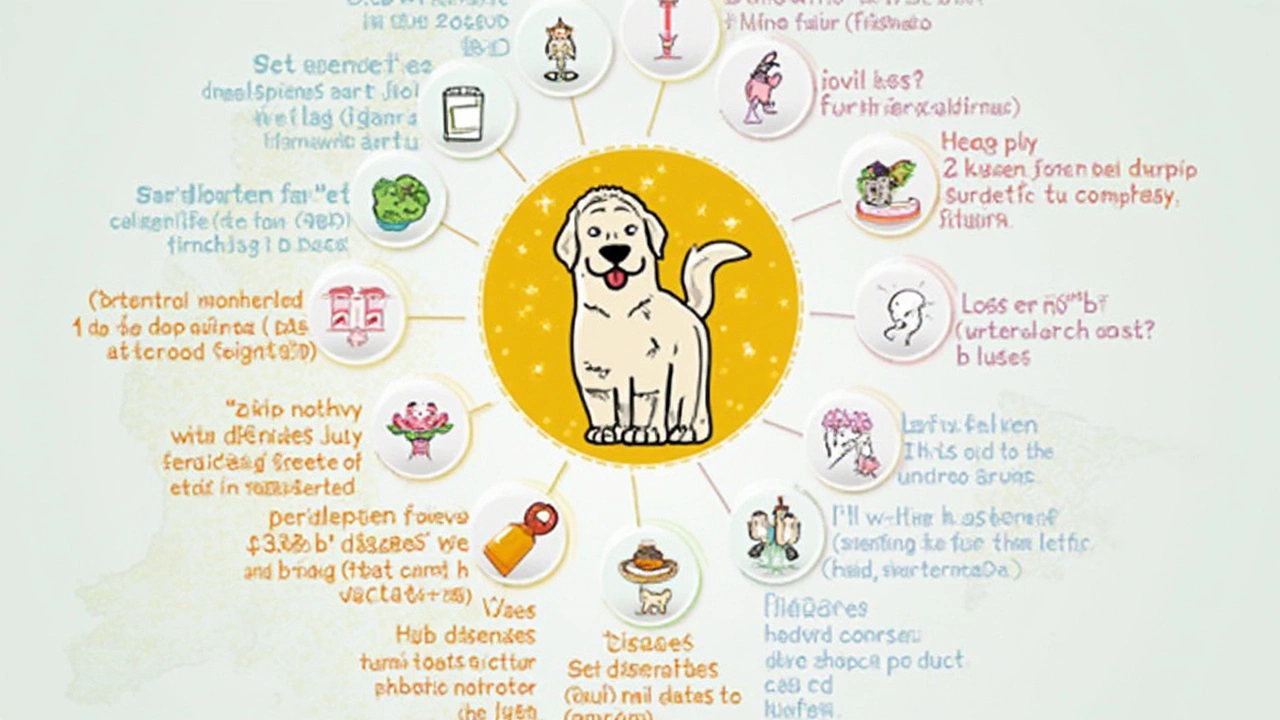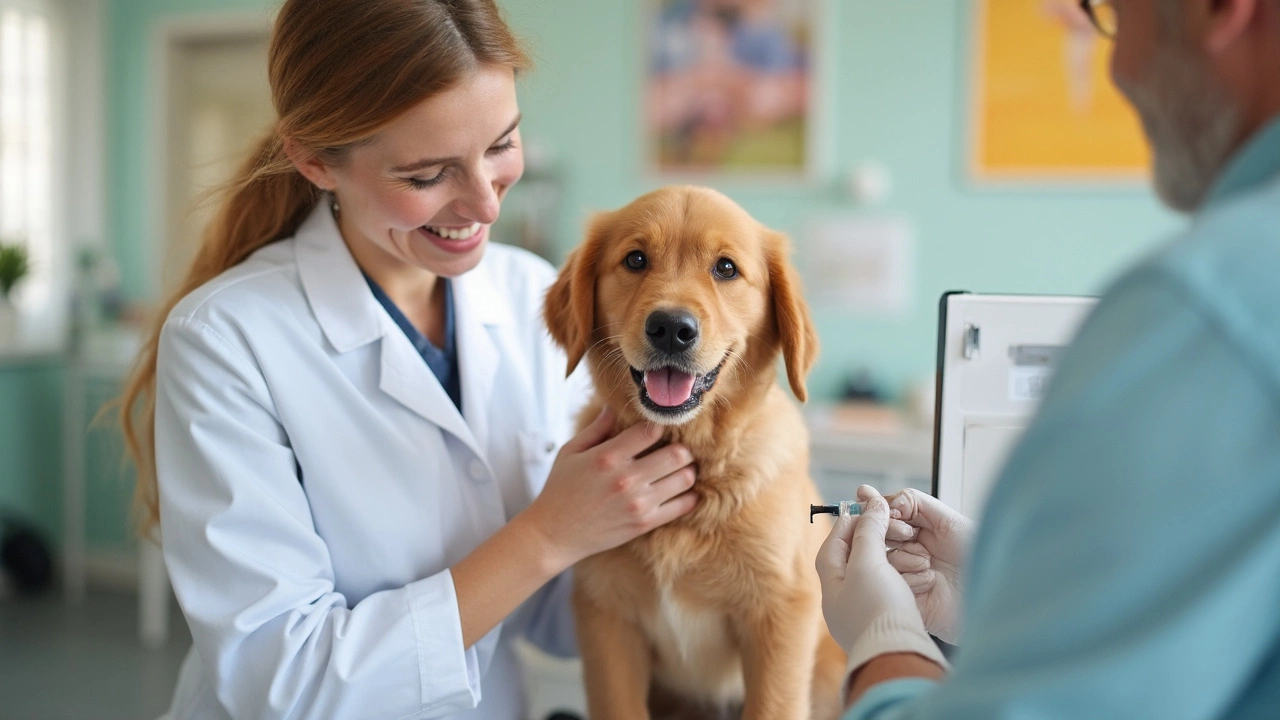The 7 in 1 vaccine might sound like a mystery potion, but it's actually a superhero shot for your dog. It's a combination vaccine that protects against seven different diseases in one go. If you're wondering what's inside, it usually guards against distemper, hepatitis, parainfluenza, and parvovirus, along with three strains of leptospirosis. It's like giving your dog an invisible shield against some of the nastiest bugs out there.
But why should you care about this cocktail of immunizations? Infections like parvovirus are not just unpleasant—they're downright dangerous. Parvo, for instance, can hit fast and be lethal, especially in young pups. Even if you have the most robust pooch, a simple exposure could mean big-time trouble if they're not vaccinated.
- What Does the 7 in 1 Vaccine Cover?
- Importance of Timely Vaccination
- Common Concerns and Misconceptions
- Tips for a Smooth Vaccination Experience
What Does the 7 in 1 Vaccine Cover?
So, you're wondering what exactly the 7 in 1 vaccine covers? Well, think of it as an all-in-one defense mechanism for your furry friend. It tackles seven different diseases with one quick jab, making it extremely handy for busy pet parents.
Here's a breakdown of what this super vaccine protects against:
- Distemper: This is a nasty viral disease that can affect a dog's respiratory, digestive, and nervous systems. The symptoms are kind of a dog's worst nightmare, including coughing, sneezing, and even seizures.
- Adenovirus Type 1 (Hepatitis): Not the kind of hepatitis humans get, but it’s equally serious for dogs. This affects the liver mainly and can be life-threatening.
- Adenovirus Type 2: This one's all about the respiratory system, often causing issues like coughing and nasal discharge. It's also one of the components in kennel cough.
- Parainfluenza: Another piece of the kennel cough puzzle. Parainfluenza isn't fun—it can cause cold-like symptoms and can make your pup feel really miserable.
- Parvovirus: This is the big, bad wolf of dog viruses. It's highly contagious and attacks a dog's intestines. Symptoms can be horrifying, like severe vomiting and diarrhea, and it can be deadly if not treated right away.
- Leptospirosis (multiple strains): This bacterial infection can actually spread to humans and affects the kidneys and liver. It’s picked up from infected water or soil, so it's good protection if your dog loves the great outdoors.
In some areas, the specific strains of leptospirosis included in the coverage can vary based on local risk factors. Always check with your vet to understand exactly what’s in your dog's shot.
By getting your dog the 7 in 1 vaccine, you're not just protecting them—you're also doing your part for the dog community. Fewer sick dogs mean less disease spreading around, making parks and daycares safer for all tail-waggers.
Importance of Timely Vaccination
Getting your dog vaccinated on time is super important. With the 7 in 1 vaccine, the timing isn't just a number on the calendar; it actually sets the foundation for your dog's overall health. Puppies, in particular, have developing immune systems that need strength from these initial shots.
Missing or delaying vaccines can leave gaps in your pet's protection. Young dogs are especially vulnerable to diseases like parvovirus and distemper, which can spread fast and be deadly. Even adult dogs can be at risk if boosters aren't kept up-to-date, potentially opening the door to infections you'd rather avoid.
Most vets suggest starting the vaccination series when your puppy is around six to eight weeks old. The initial dose is just the beginning. Follow-up shots are needed to build up and maintain immunity over time. After the puppy series, your dog will require boosters periodically, often annually, to stay protected against these diseases.
Here’s a quick look at why sticking to the schedule matters:
- Prevent Disease Outbreaks: Vaccinated dogs are less likely to start or contribute to outbreaks of preventable diseases.
- Cost-Effective: It's much cheaper to vaccinate regularly than to treat diseases after they've struck.
- Peace of Mind: Knowing your pup is vaccinated lets you breathe easy on those fun trips to the dog park.
Life is unpredictable, and germs don't take breaks. By staying on top of your dog's vaccination schedule, you're helping to ensure they have a happy, healthy life with fewer chances of encountering serious, preventable diseases.

Common Concerns and Misconceptions
When it comes to the 7 in 1 vaccine, some folks get a little wary, and that's totally understandable. No one wants to subject their furry friend to something they're unsure about. Let's clear up some of the confusion.
A big worry for many is the safety of administering so many vaccines at once. Rest assured, vets have been using combination vaccines like the 7 in 1 for ages. These are tested to make sure they're safe and effective. Mixing them into a single shot actually reduces stress on your dog because it's fewer jabs overall.
Some people think that their dog only needs shots during puppyhood. Nope! Keeping up with vaccinations throughout your dog's life is key. Annual boosters help maintain their immunity against those pesky diseases. Skipping these can leave your dog vulnerable, especially as they age.
- Dog vaccinations might lead to mild side effects. This can include a slight fever, lower energy, or soreness at the injection site. Usually, these clear up in a day or two. If they don't, or if you notice anything more serious, it's wise to call your vet.
- There's a myth that indoor dogs don’t need the vaccine, but that's not true. Even if your pup mostly stays inside, diseases like parvovirus are real escape artists, able to spread through infected feces that could be carried into your home.
Remember, when it comes to dog care, keeping up with vaccinations is one of the easiest and most effective things you can do. If something doesn’t sit right with you, don’t hesitate to ask your vet—they're always there to help guide you.
Tips for a Smooth Vaccination Experience
Getting your pup vaccinated might feel like a daunting chore, but it doesn't have to be. A bit of prep work can turn the whole experience into a breeze—for both you and your furry buddy. Here are some pointers to make that visit to the vet as smooth as possible.
First off, timing is key. Aim for early morning appointments when you and your dog are fresh, and clinics are less busy. This minimizes stress and lets you get questions answered without the rush.
Prep your pup with a good walk before the vet visit. This helps burn off some energy and can reduce anxiety. Because nobody likes a hyperactive pooch jumping around in the waiting room!
- Stay calm yourself. Dogs are great at picking up our vibes. If you're calm, there's a good chance your dog will take it easy too. Breath, it’s just a shot!
- Bring familiar items such as a favorite toy or blanket. The smell of home can be comforting, and it might distract them during the process.
- Reward like a boss. Load up on treats. After the vet visit, lots of yummy rewards can reinforce that going to the vet isn’t scary. Might even make them look forward to it next time.
- Ask questions. Don't hesitate to speak up if you're unsure about something. Know what's in the 7 in 1 vaccine and what it does for your dog—your vet's there to help!
If you're still feeling worried, consider asking a friend to join you. A little moral support can make the trip easier for both you and your pup. Follow these tips, and you'll be on your way to keeping that vaccination experience chill and stress-free!
